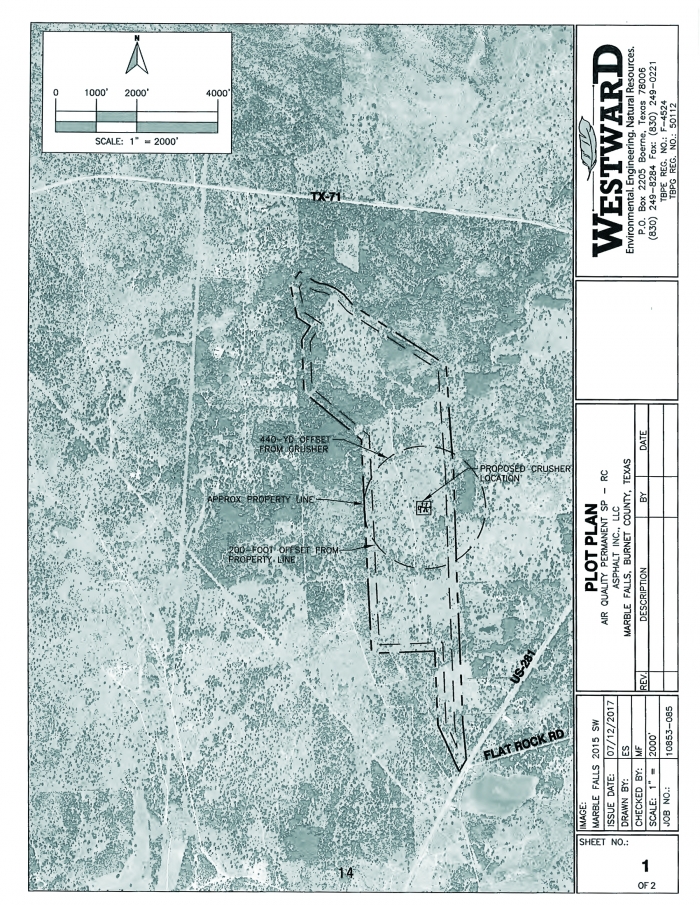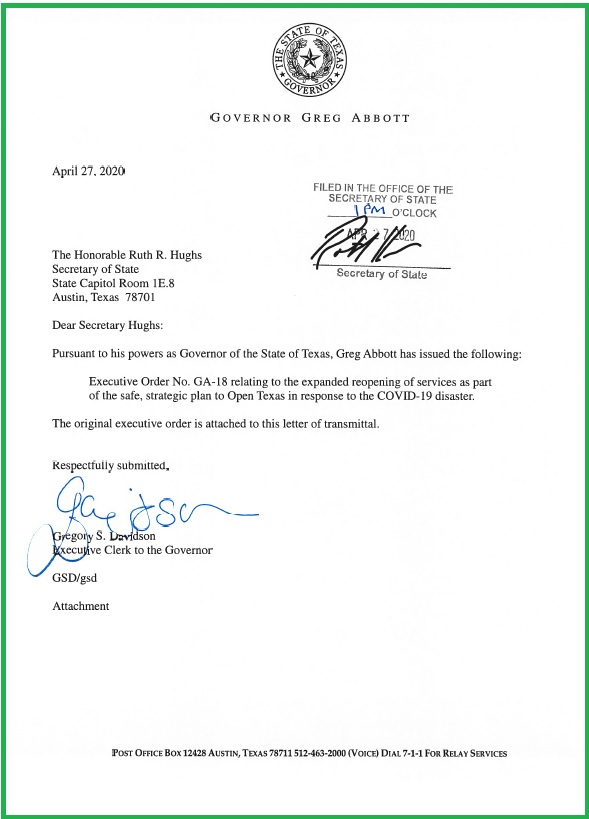TCEQ: Rock crushing plant won't harm hospital, patients

By Lew K. Cohn
Managing Editor
The Highlander
Texas Commission on Environmental Quality officials do not believe a rock-crushing plant south of Marble Falls would have an impact on air quality at Baylor Scott & White Medical Center, according to a letter sent to state Sen. Dawn Buckingham Thursday.
However, the letter also states the TCEQ “does not operate an air quality monitor in the immediate area of the proposed facility” with the closest particulate monitoring station some 25 miles east of the proposed plant site.
Earlier this month, Buckingham, R-Austin, had sent a list of questions to TCEQ executive director Richard A. Hyde PE about the impact the proposed Asphalt Inc. facility would have on air and water quality and how its permit would be enforced prior to a scheduled 7 p.m. Oct. 26 informational meeting about the permit at Lakeside Pavilion in Marble Falls.
Buckingham made the seven-page response from Hyde available to the press Friday morning. Her staff said she was traveling Friday and unable to comment on the letter at that time.
In the letter, Hyde indicated that as long as Asphalt Inc. remains in compliance, there would be no impact to the hospital from the operation.
“Based on the TCEQ's conservative modeling analysis, we are confident when a company operates in compliance with the standard permit, there should be no deterioration of air quality that would cause health effects to the surrounding community, including the patients and staff at the hospital,” the letter stated. “The Baylor Scott & White Medical Center is located approximately three miles from the proposed site location; therefore, any potential dust from the proposed site would not harm the patients and staff of the hospital.”
Although the entrance to the proposed site is about approximately 2.6 miles from the hospital, according to Google Maps, the actual linear distance between the site where the crusher would be located and the hospital is less than 1.75 miles.
Hyde's letter acknowledges the most common health concern about crushing operations, like the one sought by Asphalt Inc., is related to “visible particulate matter (PM) and the potential exposure to silica.” The letter claims that while visible particulate matter can be a “nuisance,” particles generated by the crushing process “are too large to be inhaled and are therefore not directly toxic.”
According to TCEQ, only particles of dust smaller than 10 micrometers (which is about 1/7th the thickness of human hair) are able to be inhaled, while only particles a fourth of that size, 2.5 micrometers, can get deep into the lungs to cause harm to human health.
“Due to their size, these large particles typically fall onto the ground close to the source, limiting off-property impacts,” the letter states. “Additionally, the standard permit requires substantial dust control processes to minimize dust issues including paving in-plant roads and work areas, using water sprays on stockpiles, and using a suction shroud and three-sided curtain to prevent flyaway dust.
“The standard permit requirements ensure that concentrations of small particles that are able to be inhaled … are below federal air quality standards set to protect public health,” the letter states.
Hyde indicated the TCEQ standard pemit evaluates impact to air quality of crushed material using an assumption of up to 20 percent crystalline silica, which is the particulate most likely to be harmful and predictive modeling shows concentrations of silica would be half what TCEQ considers of concern to human health.
However, Hyde also said the closest particulate monitoring station is the TCEQ's Austin Audubon site, which is 25 miles east of the location where Asphalt Inc. wishes to locate its crushing facility.
“Historically, particulate concentrations measured at the Austin Audubon location have been below the federal air quality standards. Given the rural nature of the area and limited number of industrial sources, the TCEQ would not expect any potential air quality concerns in the area of the proposed facility,” Hyde said.
Hyde said a “protectiveness review” was conducted on the Air Quality Standard Permit by Asphalt Inc. Such a review exists to “ensure emissions from facilities authorized under the standard permit are protective of human health and the environment no matter where in the state it is located,” the letter from Hyde stated.
Review parameters include emission source types and associated emission parameters, meteorological data, a receptor grid, and model use and techniques, Hyde wrote, and modeling under such a review “tends to over-predict ground-level concentrations of emissions from the proposed facility.”
Operating restrictions
Hyde said TCEQ standard permit for rock crushing plants sets the following operating restrictions, which would be applied to Asphalt Inc.:
• Restricted throughput of 200 tons/hour;
• Any crusher, screen, or engine must be located no less than 200 feet from the nearest property line; • Stockpiles and other work areas must be located no less than 100 feet from the nearest property line; • Any crusher must be located no less than 440 yards from a residence, school, or place of worship; • Restricted to 1 primary crusher, 1 secondary crusher, 2 screens, and 1 internal combustion engine with less than 1,000 horsepower;
• Plant may not operate 1 hour after sunset and 1 hour before sunrise;
• Restricted to operating no more than 2,640 hours in any rolling 12 month period; and, • Stockpiles are restricted to 45 feet in height.
Hyde said Texas quarries must be registered with TCEQ as aggregate producation operations, which are “sites from which aggregates are being or have been removed or extracted from the earth, including the entire areas of extraction, stripped areas, haulage ramps, and the land on which the plant processing the raw materials is located.”
The plant may be required to register for a stormwater construction general permit, which “regulates discharge of pollutants within stormwater resulting from construction activities and requires that a Stormwater Pollution Prevention Plan (SWP3) be developed and implemented prior to the commencement of construction.”
Hyde said individuals are encouraged to report nuisance issues or suspected noncompliance by calling TCEQ Austin Regional Office at 512-339-292 or calling the toll-free complaint hotline at 888-777-3186. Complaints can also be filed by going to tceq.texas.gov/complaints.
“The TCEQ reviews all complaints that fall within its jurisdiction,” Hyde said. “If the plant is found to be out of compliance with the terms and conditions of the permit, or applicable TCEQ regulations, it may be subject to an enforcement action.”
No contested case hearing
Hyde said the permit applied for by Asphalt Inc. “does not provide an opportunity for a contested case hearing.” The informational hearing was established to give the public the opportunity to ask questions about the application and provide written comments regarding the proposed permit.
“Any comments submitted at the meeting in writing will be included and answered in the formal Response to Comments (RTC) document prepared by the TCEQ,” Hyde wrote. “The RTC will be mailed to everyone who commented on the application or who requested to be on the mailing list for the application.”
Representatives from Asphalt Inc. have indicated to TCEQ staff they will attend the meeting and be available to answer questions.






